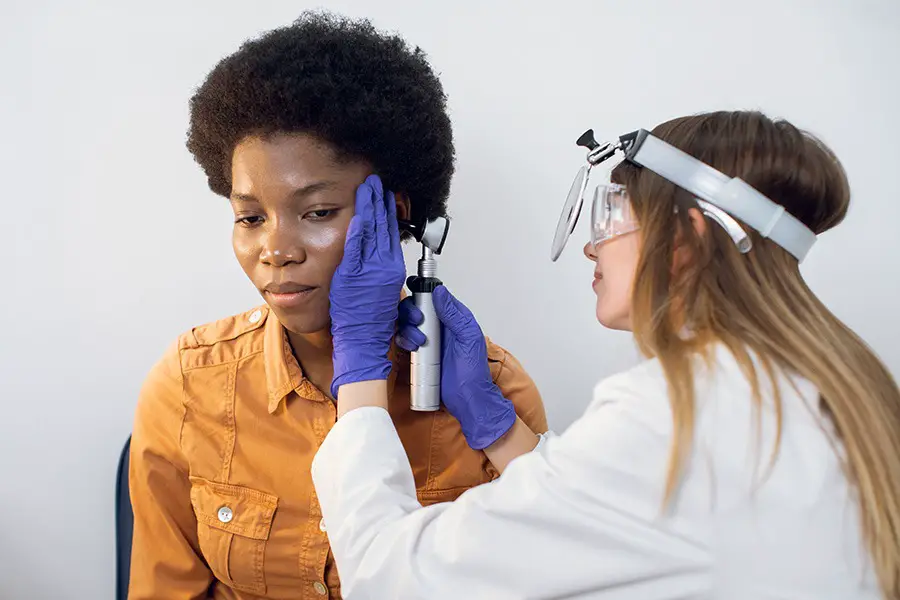Introduction
In our quest as healthcare providers, we constantly aim to enhance patient results and deliver all-encompassing care. One realm often overlooked is the relationship between meningitis and hearing loss. This article is committed to enlightening and motivating healthcare providers by unravelling the complexities of hearing loss induced by meningitis, delving into recent research and therapy alternatives, and offering advice on supporting patients and their families throughout their recuperation journey. Grasping the nuances of this condition allows us to better assist our patients and contribute to a hopeful future for those touched by meningitis and hearing loss.
Embracing the Future with Regenerative Medicine in Meningitis and Hearing Loss
Regenerative medicine is an advancing domain, delivering optimism for those affected by meningitis and hearing loss. Dedicated researchers are formulating innovative therapies using stem cells, gene therapy, and tissue engineering to restore or substitute injured auditory structures. For instance, studies on the prospects of hair cell regeneration using stem cells are showing encouraging outcomes in animal models. Moreover, gene therapy addressing specific mutations inducing hearing loss is gathering momentum, with multiple clinical trials in progress. It’s paramount for healthcare providers to stay abreast of these cutting-edge advancements to equip patients with the latest knowledge and therapy choices.
Unspoken Aftermath: Post-Meningitis Hearing Loss
Hearing loss, a consequence of meningitis, often goes unnoticed. The inflammation and subsequent damage from meningitis can result in sensorineural hearing loss, impacting a patient’s communication abilities and daily life involvement. As healthcare providers, it’s our duty to identify signs of hearing loss associated with meningitis and underline the importance of early detection and intervention. This involves enlightening patients and their families about possible risks and guiding them in keeping a check on alterations in hearing. By taking a proactive stance, we can help minimize hearing loss’s long-term impacts on patients’ lives.
Meningitis and Hearing Loss: Strategies for Prevention, Identification, and Treatment
To lessen hearing loss risk, preventing meningitis is of utmost importance. Healthcare providers play a vital role in advocating for vaccinations, early symptom recognition, and timely treatment. In cases where meningitis is suspected, swift administration of antibiotics and corticosteroids can help lessen complications, including hearing loss. Post-recovery, it’s critical to monitor patients for hearing impairment signs and initiate appropriate diagnostic testing. Treatments for hearing loss stemming from meningitis comprise hearing aids, cochlear implants, and auditory rehabilitation, all tailored to the individual patient’s requirements.
The Arduous Journey to Recovery: Meningitis and Hearing Loss
The recuperation journey from meningitis and hearing loss can be intricate and protracted, necessitating a multidisciplinary approach. Healthcare providers should cooperate with audiologists, speech-language therapists, and other specialists to cater to the varied needs of patients. This might encompass fitting and adjusting hearing devices, offering auditory training, and implementing communication strategies. In addition, emotional and psychological support is essential in aiding patients in managing hearing loss challenges and fostering resilience throughout the recuperation journey.
The Invisible Battle: Life with Hearing Loss due to Meningitis
Hearing loss resulting from meningitis can considerably affect a patient’s quality of life, leading to feelings of seclusion, frustration, and depression. As healthcare providers, our obligation is to equip patients with the tools and resources to manage this unseen struggle. This includes teaching patients about self-advocacy, linking them with support groups, and offering advice on accessibility and accommodations in various situations. By empowering patients to manage their hearing loss journey, we can contribute to their overall wellness and long-term success.
Meningitis and Hearing Loss: A Guidebook for Healthcare Providers
Healthcare providers must be well-versed with the intricacies of meningitis and hearing lossto deliver holistic care to their patients. This includes keeping informed about recent research, diagnostic techniques, and treatment possibilities. It is equally essential to understand the emotional and psychological hurdles associated with hearing loss due to meningitis and offer empathetic support. Guiding patients towards resources, including support groups and financial aid programs, can help lighten the burden of hearing loss. By being informed, compassionate, and proactive, healthcare providers can significantly improve the lives of those impacted by meningitis and hearing loss.
Meningitis and Hearing Loss: The Crucial Role of Early Detection
Timely detection of hearing loss post-meningitis is key to improving patient outcomes. Healthcare providers need to be alert for signs of hearing impairment and implement regular audiological evaluations in patients recovering from meningitis. This proactive strategy can enable timely intervention and reduce the long-term impact of hearing loss. Furthermore, educating patients and their families about the significance of monitoring hearing changes and seeking swift evaluation can support early detection efforts.
Audien BTE (Behind the Ear) Rechargeable OTC Hearing Aid
Experience Unparalleled Sound Quality with the New Audien BTE (Behind the Ear) hearing amplifier. Elevate your hearing with the clearest, highest-quality sound available in an over-the-counter hearing assistance device. Designed by Audien, renowned for their sleek and comfortable hearing devices, the BTE model ensures exceptional hearing performance. It features advanced digital technology, including four environmental modes, background noise reduction, feedback cancellation, and two directional microphones per unit (four in total).
Say Goodbye to Missed Conversations and Hello to Superior Sound. Audien hearing devices excel at amplifying speech while reducing background noise, allowing you to effortlessly engage in conversations with friends and family. Experience the consistent, long-lasting, and sharp sound quality without any whistling or feedback issues. With customizable volume control, you can easily adjust the amplification to meet your individual needs. These devices are perfect for enhancing high tones and improving TV dialogue clarity.
Rechargeable for Uninterrupted Use. The Audien BTE hearing amplifiers are 100% rechargeable, offering convenience and freedom from the hassle of tiny button batteries. With wireless magnetic charging technology, you can enjoy a 20-hour battery life with just a quick two-hour charging time. The included charging case provides up to three full charges, giving you a total of 60 hours of amplified sound. Simply place the devices in the case, and they will wirelessly charge, ensuring you’re always ready to hear your best. Experience the ease and reliability of Audien sound amplifiers, ideal for individuals with dexterity issues or those tired of constantly purchasing and replacing batteries.
Meningitis and Hearing Loss: The Impact of Cutting-Edge Technologies
Technological advancements are transforming the diagnosis and management of hearing loss due to meningitis. These breakthroughs include state-of-the-art diagnostic tools, such as otoacoustic emissions testing and auditory brainstem response testing, providing invaluable insights into the extent of hearing loss. Additionally, hearing devices like cochlear implants and bone-anchored hearing aids are constantly improving, offering patients superior sound quality and functionality. Healthcare professionals should stay current with these advancements to offer patients the most efficient solutions for their hearing needs.
Conclusion
In our role as healthcare professionals, we have identified a significant connection between meningitis and hearing loss. A complex condition often overlooked, meningitis-induced hearing loss is a critical area that requires our attention. This requires not only an understanding of the intricacies of the condition but also a commitment to improve patient outcomes through the latest research and treatment options. Our efforts to support patients and their families during their recovery journey can make a significant difference.
We are witnessing a promising era of regenerative medicine that is revolutionizing our approach to treating meningitis and hearing loss. Innovative therapies such as stem cells, gene therapy, and tissue engineering are being developed to repair or replace damaged auditory structures. Simultaneously, the emotional and psychological challenges of living with hearing loss post-meningitis cannot be ignored. Our role extends beyond medical treatment; it includes helping patients navigate this invisible struggle and empowering them to take control of their recovery journey.
Prevention, diagnosis, and treatment strategies form the backbone of our efforts to mitigate meningitis and associated hearing loss. As healthcare professionals, it is crucial for us to promote vaccination, recognize early symptoms, and ensure prompt treatment. Furthermore, we need to be proactive in monitoring for signs of hearing impairment post-recovery, facilitating early intervention and minimizing the long-term effects of hearing loss.
Early detection and the use of advanced technologies are pivotal in managing meningitis-related hearing loss. Regular audiological assessments and the utilization of state-of-the-art diagnostic tools are integral components of a proactive healthcare strategy. These efforts, coupled with patient education, support early detection and timely intervention, reducing the impact of hearing loss on patients’ lives.
Recovery from meningitis and associated hearing loss often involves a complex, multi-disciplinary approach. Collaboration among healthcare professionals, audiologists, speech-language therapists, and other specialists is essential. Together, we can provide comprehensive support, from fitting and adjusting hearing devices to offering emotional support, thus fostering resilience throughout the recovery journey.
In conclusion, our role as healthcare professionals extends far beyond immediate treatment. By staying informed about the latest research, employing early detection strategies, providing comprehensive care, and understanding the emotional and psychological toll of meningitis-related hearing loss, we can significantly improve patient outcomes. With advancements in regenerative medicine, diagnostic tools, and hearing devices, we can foster hope and resilience in those living with meningitis-induced hearing loss.
Lorem ipsum dolor sit amet, consectetur adipiscing elit. Ut elit tellus, luctus nec ullamcorper mattis, pulvinar dapibus leo.

Decoding Silence: An Analytical View on the Advances in Conductive Hearing Loss Research and Treatment
This analytical article sheds light on conductive hearing loss, offering an in-depth exploration of its genetic factors, treatment advances, and promising experimental therapies.

Embracing the Melody of Life: Navigating the Journey with Conductive Hearing Loss
A blog post delving into the experiences and challenges of living with conductive hearing loss, discussing its impact on everyday life, social interactions, mental health, and the potential benefits of hearing aids and cochlear implants.





